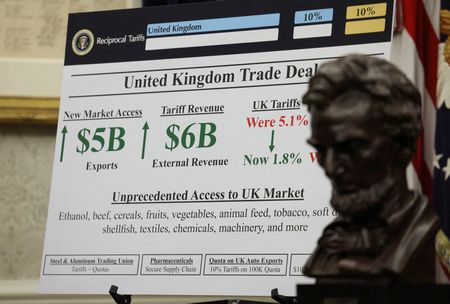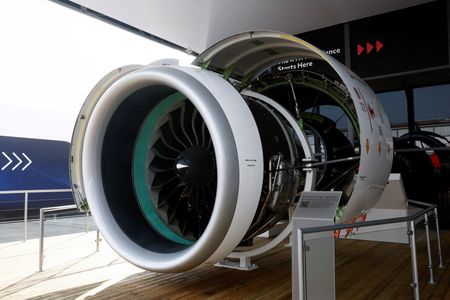LONDON (Reuters) – The removal of UK tariffs on U.S. ethanol in the U.S.-UK trade deal could sound the death knell for Associated British Foods’ loss-making bioethanol plant at Hull, northern England, following a warning last month that its future was uncertain.
The trade deal, announced on Thursday, will reduce Britain’s 19% tariffs on U.S. ethanol to zero through a 1.4 billion-litre (370 million gallon) quota that far exceeds U.S. exports to the UK last year.
AB Foods’ CEO George Weston told Reuters on April 29 that the group’s ethanol business had faced “significant problems” with “effectively subsidised imports”.
The group, which also owns Primark and a host of grocery brands including Twinings and Ovaltine, said the way in which UK regulations were being applied to bioethanol was undermining the commercial viability of its Vivergo plant in Hull which produces bioethanol fuel for cars and animal feed.
AB Foods is calling for changes to UK bioethanol regulations regarding imports. It warned that unless talks with government “improve the position” it could mothball or close the plant, putting about 150 jobs at risk.
“We’re very clear what we need to do with the ethanol business – that’s a regulatory issue that we need government support on.”
However, the opening up of the UK ethanol market to U.S. producers means the business now faces a new challenge.
“The government’s last-minute decision to allow tariff-free ethanol imports from the U.S. into the UK is causing great anxiety to many people in the northeast of England, not least to the many employees and suppliers and farmers involved in the UK bioethanol industry,” an AB Foods spokesperson said on Friday.
They added that the company was working through the detail and “the implications” with the government.
Britain’s National Farmers’ Union warned on Thursday the ethanol measure could mean the loss of a profitable outlet for arable growers which supply the industry.
The Renewable Energy Association warned that the deal could enable U.S. producers, supported by U.S. tax credits, to sell into Britain at a cheaper rate than domestic suppliers can match.
INEOS closed its ethanol plant at its Grangemouth site in Scotland in January, blaming a reduction in demand for ethanol in Europe combined with increasing pressure from imports of ethanol from other regions.
Britain’s concession on ethanol and beef was made in return for the U.S. removal of 25% additional tariffs on steel and aluminium, and a quota of 100,000 cars at a duty of 10%. Remaining tariffs were unchanged.
British Prime Minister Keir Starmer said the deal would save jobs in the car and steel industries.
(This story has been refiled to fix a typo in paragraph 12)
(Reporting by James Davey, additional reporting by Susanna Twidale and Alistair Smout; editing by Kate Holton and Susan Fenton)











